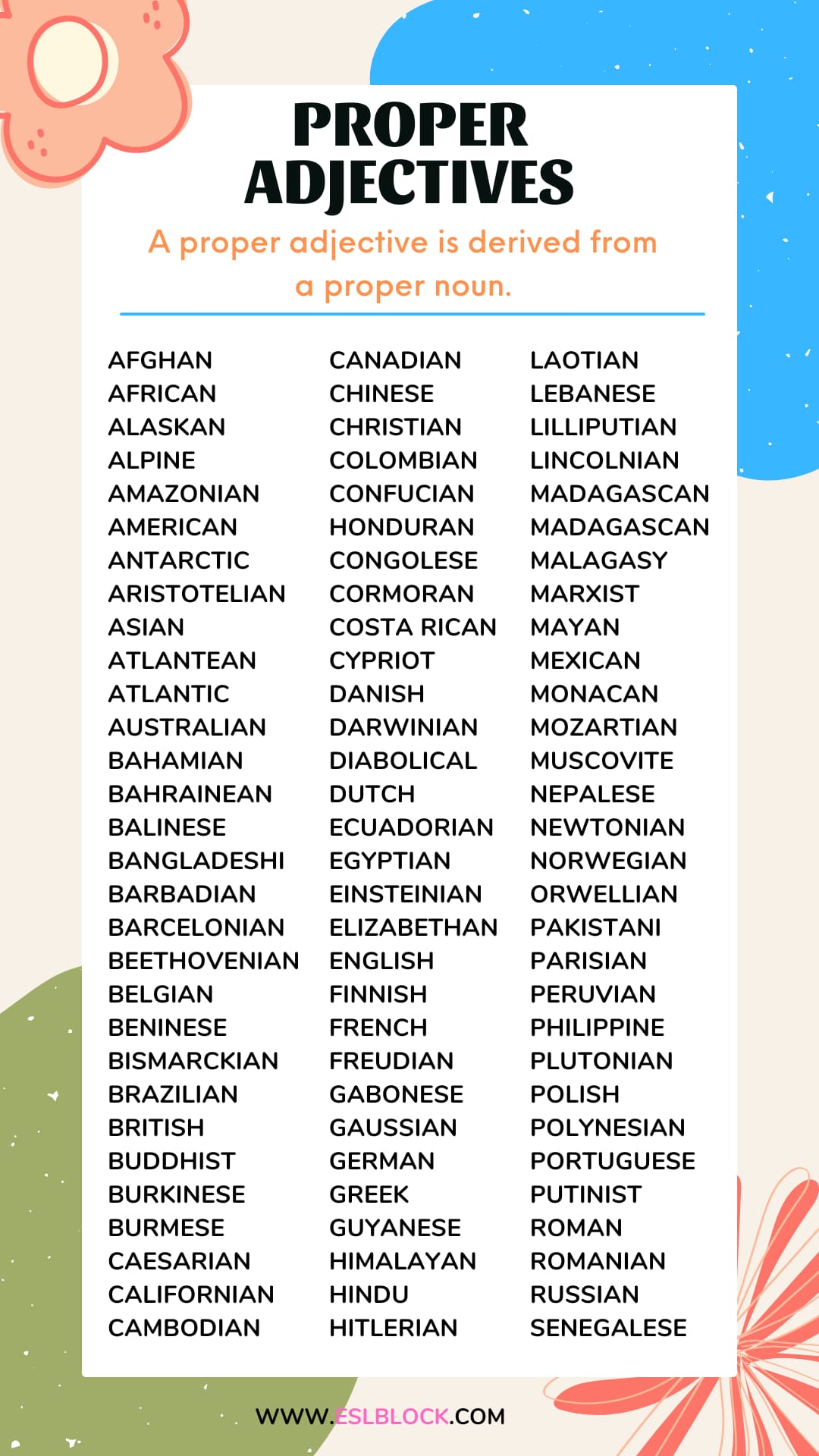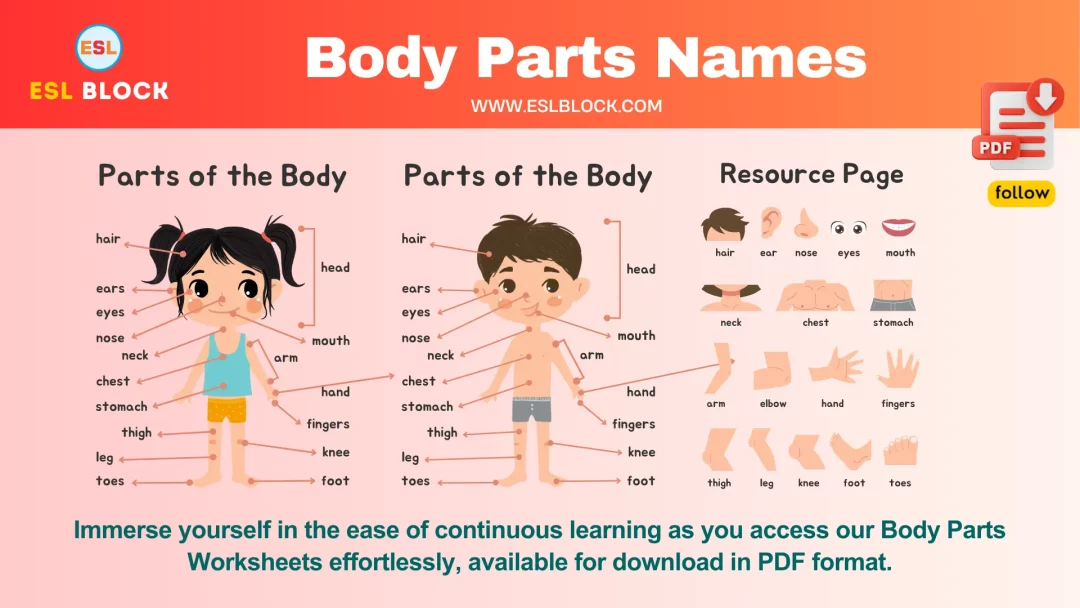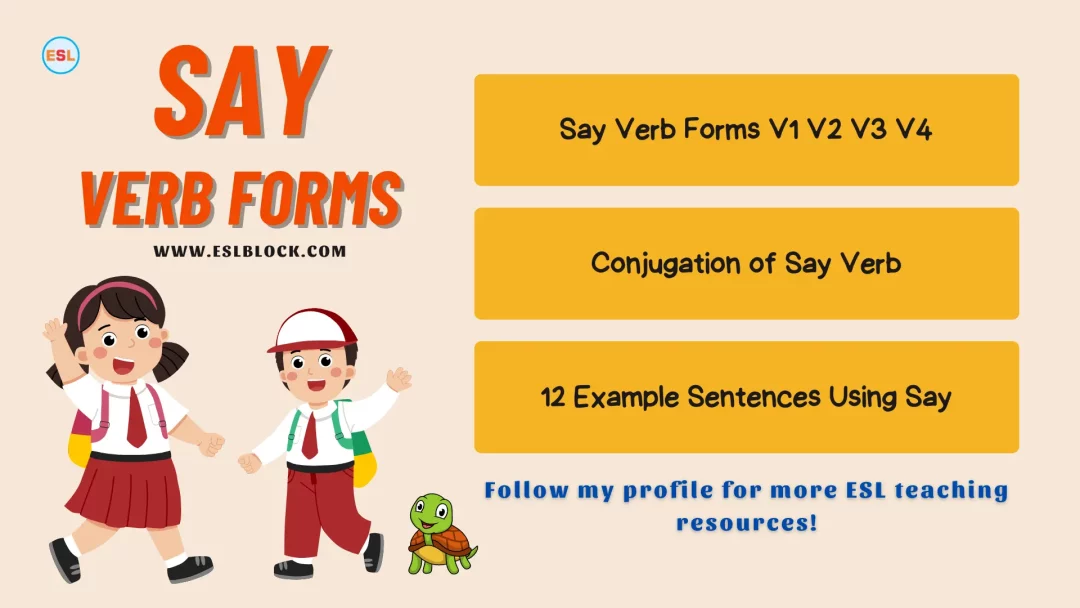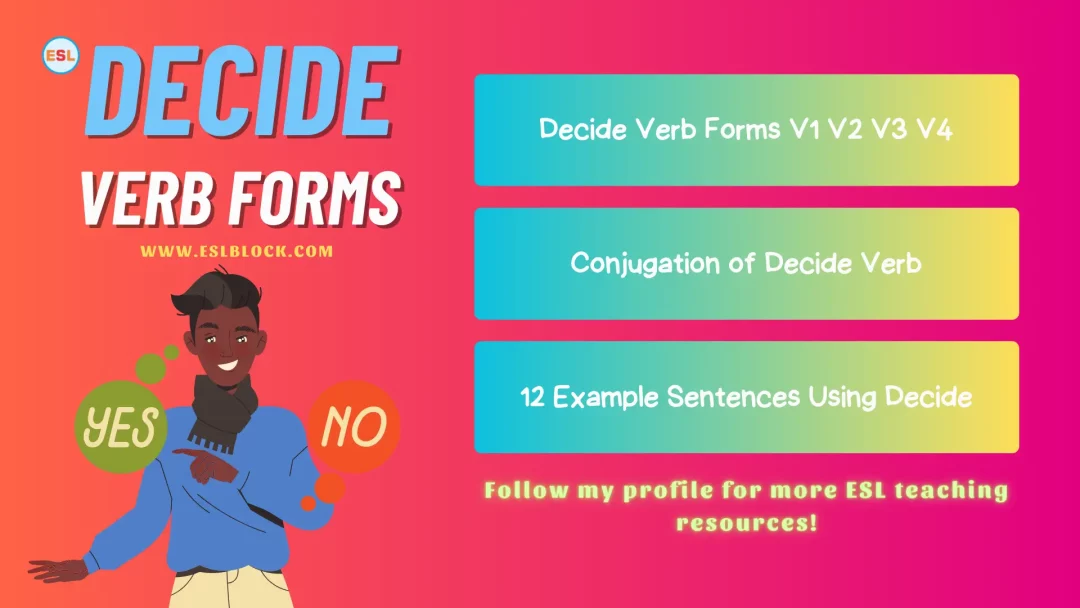What are Proper Adjectives?

![]()
What are Proper Adjectives? A proper adjective is derived from a proper noun. Therefore, exactly like an adjective, it modifies a noun or a pronoun, and like a proper noun, it is capitalized first letter. Most of the proper adjectives are made using the names of cities, countries, religions, or people.
For example, Henry is an Australian player. The word Australian is a proper adjective that comes from the proper noun Australia. Look at another sentence, Grace loves Chinese food. In this sentence, Chinese is a proper adjective that is made from China.
Proper nouns are nouns that refer to specific places, people, things, or organizations. The word “country” is a common noun because there are many countries on planet earth. The word “America” is a proper noun because there is only one America and America is its name. Just like you. You are unique and you have a name. Your name is a proper noun and in English, we spell it with a capital letter at the start like William, Oliver, Isabella, and Amelia.
If you are searching topic about “What are adjectives” then click on the link to know more about adjectives first!
Why Do We Use Proper Adjectives?
Proper adjectives are used to describe regions, for example, cities or countries as well as a group of people or an institution of thought. Many writers have a clear preference for using appropriate adjectives in their writing because of a number of reasons. The first reason is that proper adjectives are short i.e. they convey a large amount of information in a single word. Thus, using a small number of words can convey a great deal of significance. This is a plus for readers too. The readers prefer concise writings in comparison to writings that are lengthy.
- The Italian literature
- In this example, Italian is a proper adjective. If it were not for the use of this proper adjective, then the sentence will be lengthy.
- The literature is created by people who speak and write in the official language of countries such as Italy.
Proper Adjectives List
Since the proper adjectives are adjectives that are derived from proper nouns, there are hundreds or even thousands. A few common examples include anything that is derived from a particular country or person group.
- Afghan
- African
- Alaskan
- Alpine
- Amazonian
- American
- Antarctic
- Aristotelian
- Asian
- Atlantean
- Atlantic
- Australian
- Bahamian
- Bahrainean
- Balinese
- Bangladeshi
- Barbadian
- Barcelonian
- Beethovenian
- Belgian
- Beninese
- Bismarckian
- Brazilian
- British
- Buddhist
- Burkinese
- Burmese
- Caesarian
- Californian
- Cambodian
- Canadian
- Chinese
- Christian
- Colombian
- Confucian
- Confuciawas
- Congolese
- Cormoran
- Costa Rican
- Cypriot
- Danish
- Darwinian
- Diabolical
- Dutch
- Ecuadorian
- Egyptian
- Einsteinian
- Elizabethan
- English
- Finnish
- French
- Freudian
- Gabonese
- Gaussian
- German
- Greek
- Guyanese
- Himalayan
- Hindu
- Hitlerian
- Honduran
- Icelandic
- Indian
- Indonesian
- Intelligent
- Iranian
- Iraqi
- Italian
- Japanese
- Jungian
- Kazakh
- Korean
- kuban
- Kyrgyz
- Laotian
- Lebanese
- Lilliputian
- Lincolnian
- Machiavellian
- Madagascan
- Madagascan,
- Malagasy
- Marxist
- Mayan
- Mexican
- Middle Eastern
- Middle Eastern
- Monacan
- Mozartian
- Muscovite
- Nepalese
- Newtonian
- Norwegian
- Orwellian
- Pacific
- Parisian
- Peruvian
- Philippine
- Plutonian
- Polish
- Polynesian
- Portuguese
- Putinist
- Roman
- Romanian
- Rooseveltian
- Russian
- Salvadorean
- Sammarinese
- Senegalese
- Shakespearean
- Slovak
- Somali
- South American
- South American
- Spanish
- Sri-Lankan
- Sudanese
- Swazi
- Swiss
- Taiwanese
- Thai
- Thatcherite
- Tibetan
- Torontonian
- Turkish
- Turkishish
- Turkmen
- Uzbek
- Victorian
- Viennese
- Vietnamese
- Welsh
Common Adjectives vs. Proper Adjectives
Common adjectives are derived from common nouns. The majority of adjectives in speech and writing are common adjectives.
Common adjectives aren’t capitalized. This is because they’re common words that are not made up of proper nouns.
Proper adjectives originate from proper nouns. Because of this, these adjectives are capitalized.
Let’s look at the examples of Common nouns and Proper nouns;
- All the American people are not white. (American is a proper adjective)
- Pakistani salt is wonderful. (Pakistani is a proper adjective)
- She wore a beautiful dress. (beautiful is a common adjective)
- Ben is a smart baby. (smart is a common adjective)
List of Proper Adjective Forms
The majority of proper adjectives are created by adding suffixes, for example, the suffix ‘ian’, -an, or -ist to the proper noun. There are however some exceptions. Sometimes the proper noun and proper adjective of the correct form are exactly identical, and the only difference is in the parts of speech.
Here is an alphabetical list of commonly used suffixes as well as their meanings. This isn’t an exhaustive list because there are far too many proper adjectives to mention in this list. Therefore, if writers are unsure it is best to look up the dictionary.
- -ish in Spanish, Turkish
- -an in Shakespearean, European
- -ist in Methodist, Leftist
- -n in Russian, Persian, Alaskan
- -esque in Kafkaesque, Romanesque
- -ite in Jacobite
- -ian in Iranian, Brazilian
- -ese in Chinese, Lebanese
- -ic in Icelandic, Greenlandic
- -ean in Argentinean
- -i in Iraqi, Azerbaijani
- -r in Kosovar
Proper adjective example sentences
Here are a few examples of proper adjectives based on place names like city names and country names.
- Logan is an American player.
- Shahid Afridi is a Pakistani player.
- Muhammad Ali is an Asian player.
- Emily loves Chinese food.
- My sister likes Italian cuisine.
- Shakespearean sonnets are easy to comprehend.
- Petrarchan sonnets are more complex.
- She has always been a Marxist.
- There is nothing called Platonic love.
- Texan English is different from conventional English.
- He was a Serbian Tennis player.
- Japanese cars are durable.
- Mexican cuisine is an incredible dish.
- They did not understand Kantian ethics.
- He uses a Kentuckian gun.
- All the African people are not black.
- The Chinese drone is the best toy.
- So much drama took place during the Nixon era.
- Spanish chocolate cake is very rich in flavor.
- Arabic music makes you feel so good.
- The Japanese paper cranes are meant for good luck.
- I love my new Indian life.
- The Pakistani drums sounded loud in the hall.
- I dream of a Hawaiian getaway.
- The Russian opera by Stravinsky is very wonderful.
- I am looking forward to the band’s North American tour.
- Madison is really craving some Mexican food.
- Carter attended Catholic school through 10th grade.
- Elena just loves Romanesque buildings.
- Greyson is going to wear a Greek toga to the fraternity party.
- This week we are learning about Ugandan history.
- Roman bridges are beautiful.
- Researchers thought the artifacts might be Egyptian in origin.
- My father is Polish, and my mother is Albanian.
- Bella had a Swedish boyfriend.
- Jonah wore an Edwardian style costume.
- Their family is Jewish.
Proper Adjectives InfoGraphics
Here are some printable infographics about proper adjectives. Printable infographics are a fantastic way to share a significant amount of details in a short time in a stunning way. The proper adjectives infographic can help teachers and students to share their thoughts easily.

My Considerations
Since the Adjective is the main part of English reading, the importance of developing vocabulary cannot be undervalued without proper adjectives.
You can read the above simple list of proper adjectives to improve your understanding of English grammar.
Encourage your children to learn these basic but commonly used proper adjectives, by following the simple example sentences given above. Then, save this list of possessive adjectives, handy for future interview use.
If you enjoyed a printable infographic about Proper adjectives, I’d be very thankful if you’d help it spread by emailing it to your friends or sharing it on Pinterest, Reddit, Twitter, Instagram, or Facebook. Thank you!
Recap of what we just learned
- What are Proper Adjectives?
- Why Do We Use Proper Adjectives?
- Proper Adjectives List
- Common Adjectives vs. Proper Adjectives
- List of Proper Adjective Forms
- Proper adjective example sentences
- Proper adjective InfoGraphics
If you’re having any doubts about the qualities of Proper adjectives, you can leave a comment below, and we’ll attempt to give you feedback as early as possible. Thank you!
Related Topics
Explore the full list of Adjectives to Describe a Person from A to Z!
- A Adjectives to Describe a Person
- B Adjectives to Describe a Person
- C Adjectives to Describe a Person
- D Adjectives to Describe a Person
- E Adjectives to Describe a Person
- F Adjectives to Describe a Person
- G Adjectives to Describe a Person
- H Adjectives to Describe a Person
- I Adjectives to Describe a Person
- J Adjectives to Describe a Person
- K Adjectives to Describe a Person
- L Adjectives to Describe a Person
- M Adjectives to Describe a Person
- N Adjectives to Describe a Person
- O Adjectives to Describe a Person
- P Adjectives to Describe a Person
- Q Adjectives to Describe a Person
- R Adjectives to Describe a Person
- S Adjectives to Describe a Person
- T Adjectives to Describe a Person
- U Adjectives to Describe a Person
- V Adjectives to Describe a Person
- W Adjectives to Describe a Person
- X Adjectives to Describe a Person
- Y Adjectives to Describe a Person
- Z Adjectives to Describe a Person







Your place is valueble for me. Thanks!…
I have been examinating out a few of your stories and i must say nice stuff. I will make sure to bookmark your website.